|
|
|
Sort Order |
|
|
|
Items / Page
|
|
|
|
|
|
|
| Srl | Item |
| 1 |
ID:
165947
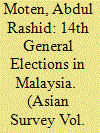

|
|
|
|
|
| Summary/Abstract |
In the 14th general election in Malaysia, the opposition coalition overturned the ruling coalition’s entrenched incumbency of over six decades. The ruling coalition suffered from a legitimacy deficit and corruption scandals. The election witnessed four coalitions of parties, but these coalitions have been ephemeral, and Malaysian politics continues to be based on racial arithmetic.
|
|
|
|
|
|
|
|
|
|
|
|
|
|
|
|
| 2 |
ID:
061417
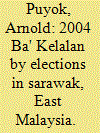

|
|
|
|
|
| Publication |
Apr 2005.
|
| Summary/Abstract |
In Malaysia, democracy is generally interpreted in electoral terms. Arguably, the current electoral system in Malaysia denies ordinary ordinary people their rights to elect their preferred representatives and contributes to the erosion of democracy. The 2004 Ba’ Kelalan by-election is a demonstration of the above predicament. This article argues that irregularities in the conduct of the by-election demonstrate how democratic rights had once again been denied. The article also shows how the Lun Bawang community plays a pivotal political role in determining the balance of power among the ethnic groups in Sarawak.
|
|
|
|
|
|
|
|
|
|
|
|
|
|
|
|
| 3 |
ID:
096823
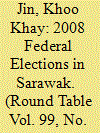

|
|
|
|
|
| Publication |
2010.
|
| Summary/Abstract |
In the aftermath of the 8 March elections, Sarawak was cast as an outlier, recalcitrant even, to the perceived 'revolt' against the incumbent Barisan Nasional. This short note attempts to show that Sarawak actually fell within the overall voting pattern viewed in its total range, rather than in summary outcomes. In that context, the note then attempts to argue that the voting patterns can be accounted for by local reasons, hopes and fears, particularly in the case of the minority indigenous groups collectively categorised as 'Other bumiputera'. However, Chinese and Malay constituencies exhibited a pattern clearly correlated to ethnicity.
|
|
|
|
|
|
|
|
|
|
|
|
|
|
|
|
| 4 |
ID:
086137
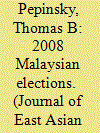

|
|
|
|
|
| Publication |
2009.
|
| Summary/Abstract |
Malaysia's twelfth general elections, held on March 8, 2008, dealt a stunning blow to the incumbent Barisan Nasional regime. For the first time since 1969, the coalition did not receive its customary two-thirds majority in the lower house of parliament. Moreover, the opposition was able to form governments in five out of eleven peninsular Malaysian states. This article uses electoral, economic, and demographic data to test a number of potential explanations for these outcomes. Evidence indicates that the regime's decreased majority is the consequence of non-Malay voters' rejecting the incumbent regime in favor of secular opposition parties.
|
|
|
|
|
|
|
|
|
|
|
|
|
|
|
|
| 5 |
ID:
140284
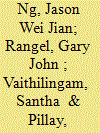

|
|
|
|
|
| Summary/Abstract |
In this article we examine the electoral impact of urbanization vis-à-vis ethnicity in Malaysia. We employ a robust econometric technique, the fractional response logit model, on data from the recently concluded thirteenth general election. The findings show that there are both an ethnic effect and an urban effect in determining the distribution of parliamentary seats among the political groups. Strong support for the opposition coalition, Pakatan Rakyat, was evident in urban constituencies, while the ruling coalition, Barisan Nasional, continued to enjoy success in rural constituencies. Although Barisan Nasional is still dependent on Bumiputera support, its success is also dependent on non-Bumiputera support from rural constituencies. However, with declining birthrates among the Chinese electorates, this support may not be forthcoming in future elections. We also provide insights for both coalitions to consider in developing strategies for the next election.
|
|
|
|
|
|
|
|
|
|
|
|
|
|
|
|
| 6 |
ID:
072047
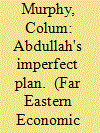

|
|
|
| 7 |
ID:
087480
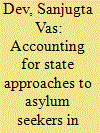

|
|
|
|
|
| Publication |
2009.
|
| Summary/Abstract |
This article uses the case studies of Australia and Malaysia to examine how diverse states in the Asia-Pacific region approach asylum seekers in practice and in discourse. Using a social constructionist approach to identity, the article highlights how governments in each country have grappled with "irregular" migration and the challenges it poses for national identity through processes of "othering" and "exclusion." This comparison shows that the process of excluding asylum seekers on the basis of identity is not a Western phenomenon, but one extending to countries across the region.
|
|
|
|
|
|
|
|
|
|
|
|
|
|
|
|
| 8 |
ID:
120249


|
|
|
|
|
| Publication |
Singapore, ISEAS, 2012.
|
| Description |
xvii,347p.pbk
|
| Standard Number |
9789814379649
|
|
|
|
|
|
|
|
|
|
|
|
Copies: C:1/I:0,R:0,Q:0
Circulation
| Accession# | Call# | Current Location | Status | Policy | Location |
| 057274 | 337.1/DAS 057274 | Main | On Shelf | General | |
|
|
|
|
| 9 |
ID:
163303
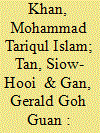

|
|
|
|
|
| Summary/Abstract |
This article presents the advanced financial literacy of Malaysian Gen Y investors and investigates whether literacy varies across demographics and ethnicity, and how financial literacy is related to investing decisions. In a survey-based study (N = 231) with the estimation of crosstab, ordered logistic regression and binary logistic regression, the results suggest that Gen Y investors display a medium level of financial literacy and that investors with certain demographic characteristics and ethnicity display a relatively higher level of financial literacy. Literacy items such as knowledge of stocks and bonds, functioning of the stock market, working of long-term bonds and mutual funds, and riskiness of bonds versus stocks are more closely related to investors’ trading, risky share investment, willingness of risk-taking, stock market participation and perceived portfolio returns. The results imply a clear scope to improve Gen Y investors’ financial literacy by concentrating on a certain socio-demographic groups and specific financial literacy items.
|
|
|
|
|
|
|
|
|
|
|
|
|
|
|
|
| 10 |
ID:
140004


|
|
|
|
|
| Summary/Abstract |
As the end of 2015 draws nearer, the prospect of meeting all the goals of the ASEAN Economic Community (AEC) Blueprint appears dimmer by the day. The literature identifies two prominent gaps in ASEAN’s journey towards an economic community as defined by its own vision. First, the extensive literature on the AEC, and this includes the scorecard designed to monitor the implementation of its goals, suggests that there appears to be a gap between commitments and the achievements of the AEC Blueprint targets. Second, attaining a “free flow of services” as stated in the AEC goals, is also hampered by a gap between commitments in liberalization and actual practice. The objectives of this paper are twofold. First, it seeks to review the gap between commitments and practice in Malaysia. Second, it aims to examine domestic conflicts that may constrain Malaysia’s services liberalization efforts in ASEAN. A key question considered in the analysis is the source or sources of these conflicts. Is the conflict confined to the private sector or is the government conflicted from within in terms of services liberalization? In other words, are there certain policies that may negate or off-set liberalization efforts? The key finding in this paper shows conflicting objectives in government policies to be the main reason for the slow pace of liberalization thus far.
|
|
|
|
|
|
|
|
|
|
|
|
|
|
|
|
| 11 |
ID:
119368
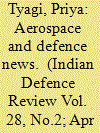

|
|
|
| 12 |
ID:
142515
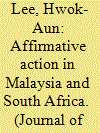

|
|
|
|
|
| Summary/Abstract |
This paper examines affirmative action in Malaysia and South Africa, two regimes that favor majorities. Malaysia’s highly centralized and discretionary programme is in contrasts with South Africa’s more democratized, decentralized and statutory structure. With regard to affirmative action outcomes, both countries have made quantitative gains in increasing representation of Bumiputeras in Malaysia and blacks in South Africa, in tertiary education and high-level occupations. However, there is also evidence to suggest continuing, primarily qualitative, shortfalls, in terms of graduate capability, dependence on public sector employment, and persistent difficulty in cultivating private enterprise. The results reported here emphasize the importance of implementing affirmative action effectively in education, while exercising restraint in employment and enterprise development.
|
|
|
|
|
|
|
|
|
|
|
|
|
|
|
|
| 13 |
ID:
148242
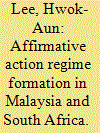

|
|
|
|
|
| Summary/Abstract |
This paper examines the formation of majority-favouring affirmative action (AA) regimes in Malaysia and South Africa. Malaysia’s Constitution premises AA on a group’s special position; South Africa’s refers to unfair discrimination. Malaysia established AA amid continuation of a political order and consolidation of executive power, while South Africa democratized and transitioned from minority to majority rule. Minority groups held less economic power in Malaysia than in South Africa. Consequently, AA in Malaysia is characterized by discretionary decision-making, and quota-based, centralized programmes, whereas South Africa has followed a legislative route involving negotiation and enforcement of target-based, statutory requirements, under less centralized oversight.
|
|
|
|
|
|
|
|
|
|
|
|
|
|
|
|
| 14 |
ID:
052488
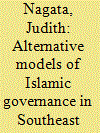

|
|
|
|
|
| Publication |
June 2004.
|
| Summary/Abstract |
In the prevailing political world order, sovereign nation-states and secular political authority widely face competition from transnational religious communities, whose authority and agendas derive from different principles. This is particularly evident in Islam, where ulama may acquire political power, while governments appropriate religious interpretations to their own purposes, and even determine who is orthodox or heretical in their domain. This article focuses on the origins and spread of one Malay Islamic movement, Al Arqam, inspired by a rare mix of global Sufi and strict Shari'ah traditions, many of whose members were organized into residential communes and institutions promoting economic independence, mutual support, social service and extensive mission. With their schools, clinics, farms and factories, this amounted to an experiment in alternative development and governance, although not explicitly as an Islamic state. Arqam's moral example and its success in recruiting technically skilled, highly educated young Malays, however, was perceived by the Malaysian government, as its own loss, and a threat to its legitimacy, and the movement was eventually banned. Through this non-violent ideological confrontation, Arqam became de facto political, as well as a 'heresy', in this local understanding of 'political Islam'.
|
|
|
|
|
|
|
|
|
|
|
|
|
|
|
|
| 15 |
ID:
150781
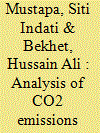

|
|
|
|
|
| Summary/Abstract |
The demand for transport services is expected to rise, causing the CO2 emissions level to increase as well. In Malaysia, the transportation sector accounts for 28% of total CO2 emissions, of which 85% comes from road transport. By 2020, Malaysia is targeting a reduction in CO2 emissions intensity by up to 40% and in this effort the role of road transport is paramount. This paper attempts to investigate effective policy options that can assist Malaysia in reducing the CO2 emissions level. An Optimisation model is developed to estimate the potential CO2 emissions mitigation strategies for road transport by minimising the CO2 emissions under the constraint of fuel cost and demand travel. Several mitigation strategies have been applied to analyse the effect of CO2 emissions reduction potential. The results demonstrate that removal of fuel price subsidies can result in reductions of up to 652 ktonnes of fuel consumption and CO2 emissions can be decreased by 6.55%, which would enable Malaysia to hit its target by 2020. CO2 emissions can be reduced significantly, up to 20%, by employing a combination of mitigation policies in Malaysia. This suggests that appropriate mitigation policies can assist the country in its quest to achieve the CO2 emissions reduction target.
|
|
|
|
|
|
|
|
|
|
|
|
|
|
|
|
| 16 |
ID:
110732


|
|
|
|
|
| Publication |
2011.
|
| Summary/Abstract |
Thermodynamic losses usually take place in machineries used for agricultural activities. Therefore, it is important to identify and quantify the losses in order to devise strategies or policies to reduce them. An exergy analysis is a tool that can identify the losses occurred in any sector. In this study, an analysis has been carried out to estimate energy and exergy consumption of the agricultural sector in Malaysia. Energy and exergy efficiencies have been determined for the devices used in the agricultural sector of Malaysia, where petrol, diesel and fuel oil are used to run the machineries. Energy and exergy flow diagrams for the overall efficiencies of Malaysian agricultural sector are presented as well. The average overall energy and exergy efficiencies of this sector were found to be 22% and 20.728%, respectively, within the period from 1991 to 2009. These figures were found to be lower than those of Norway but higher than Turkey.
|
|
|
|
|
|
|
|
|
|
|
|
|
|
|
|
| 17 |
ID:
106787
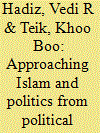

|
|
|
|
|
| Publication |
2011.
|
| Summary/Abstract |
The article traces the trajectories of Islamic politics in Indonesia and Malaysia in relation to the changing political economy of these two countries. The approach adopted is to understand Islamic politics less on the basis of Islamic doctrine, or conflicts over its interpretation, than in connection with the changing social bases of politics, the context established by capitalist economic transformations, the evolution of the post-colonial state from the Cold War and its aftermath, and of crises of political economy in the 1980s and 1990s. The exercise reveals important convergences and divergences in trajectories that help to explain the complex historical processes which have shaped Islamic politics in these two cases and possibly beyond. It also reveals the entanglement of Islamic politics in very profane conflicts over power and tangible economic resources over time. In both countries a new form of Islamic populism has emerged as a major articulator of grievances against the secular state and perceived social injustices. However, the same historical processes have enabled the social agents of Islamic politics in Malaysia to contest state power more effectively than their counterparts in Indonesia.
|
|
|
|
|
|
|
|
|
|
|
|
|
|
|
|
| 18 |
ID:
149530
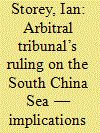

|
|
|
|
|
| Summary/Abstract |
Three and a half years after the Philippines took the unprecedented step of challenging the legal basis of China’s expansive maritime claims in the South China Sea, the Arbitral Tribunal established under compulsory dispute resolution provisions contained in the United Nations Convention on the Law of the Sea (UNCLOS), and based at the Permanent Court of Arbitration in The Hague, issued its final ruling on 12 July 2016.
|
|
|
|
|
|
|
|
|
|
|
|
|
|
|
|
| 19 |
ID:
191782
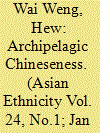

|
|
|
|
|
| Summary/Abstract |
Inspired by the concept of ‘archipelagic Islam’ and the recent academic call for archipelagic thinking, this article proposes the term ‘archipelagic Chineseness’ to analyze various discourses and practices of Chineseness that take into account diverse national and local contexts, without disregarding various transnational connections. However, different from the proponents of ‘archipelagic Islam’ who promote an ideal type of Islamic identity in Indonesia, I use ‘archipelagic Chineseness’ mainly not to prescribe a kind of ideal Chinese identity, but instead to explore and theorize multiple ways of being or not being Chinese in Indonesia, Malaysia, and beyond. The concept points to the possibility of being Chinese in a way that is neither totally subscribed to China’s growing influence, nor completely assimilated due to the demand of some nationalists. By examining the trends of Chinese-style mosques and Chinese Muslim preachers, I discuss how and under what conditions different Chinese and non-Chinese Muslims appropriate Chineseness for diverse reasons. While the Chinese-style mosques borrow the architectural design of ancient mosques in China, they adopt local cultural traditions and interact with local politics. Many Muslim leaders welcome such mosques as an initiative to promote localized Islam and to imagine a translocal Chinese Muslim identity. However, when it comes to preachers, there are contesting – if not conflicting – cultural and religious orientations, which are shaping and being shaped by the politics of race, religion and class in both countries. Thus, I propose ‘archipelagic Chineseness’ to analyze various entanglements of diverse transnational connections, national belongings and local sensibilities among ethnic Chinese in general and Chinese Muslims in particular. Archipelagic thinking around Chineseness also allows us to explore how ethnic Chinese in maritime Southeast Asia negotiate their Chineseness with their other identities, such as nationalities, localities, religion, and sexual identities.
|
|
|
|
|
|
|
|
|
|
|
|
|
|
|
|
| 20 |
ID:
098379
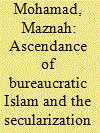

|
|
|
|
|
| Publication |
2010.
|
| Summary/Abstract |
Malaysia's trend of mounting religiosity should not be seen as merely stemming from political rivalry between its two biggest Muslim parties (UMNO and PAS) but also from another source, its Sharia-aspiring bureaucracy. The hegemony of this religious bureaucracy is based on its power as arbiter of the "right" or official Islam and its oversight over Sharia laws and Islamic public institutions. Insulated from voters' displeasure and, to a large extent through its strategy of invoking the immutability of Sharia, this bureaucracy has emerged as the lynchpin of Malaysia's state-driven Islamization. But even as Sharia proponents disavow secularism, the essence of Islamic legal and bureaucratic transformation is closer to a secularized adaptation than to a process of desecularization. Furthermore, as much as the bureaucracy is seemingly unstoppable, it is far from being fully stabilized as it confronts a dissenting section of the Muslim middle class who are also keen to capture the discursive, but highly fortified legal space of "authentic" Islam occupied by this bureaucracy. Ultimately, what surfaces in Islam's politicization is the contestation between a secularized Sharia bureaucracy and its juridical subjects, rather than a desecularization movement.
|
|
|
|
|
|
|
|
|
|
|
|
|
|
|
|
|
|
|
|
|